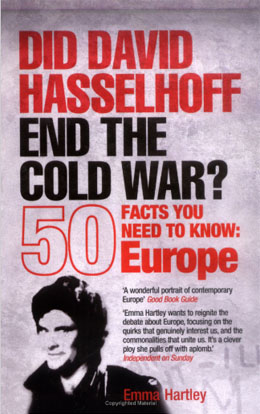Wednesday night at The Slaughtered Lamb in Clerkenwell felt like folk central.
I went to see The Urban Folk Quartet play their new album and, while standing at the bar trying to order a plate of the fantastic fish and chips they do there - what do they put in that batter? - saw that Josienne Clarke and Ben Walker were the support. At least I assumed Ben would be there - he always is. But for some reason or other, probably connected with someone's modesty, they're always just billed as Josienne Clarke.
There was this poster up behind the bar, you see.
That wasn't it. That's just the best pic I could find of the two of them.
Anyhow, this was great news and rather unexpected. I have loved The UFQ long time, and am coming to love Josienne and Ben too, although in a more piquant and understated fashion. Whereas The UFQ demands jumping up and down and undignified whooping, Ben and Josienne are a delicate, winding and unwinding proposition that requires close attention. Both bands are brilliant and brilliantly musical, but they're very different and I momentarily loved that they knew each other.
"Actually, we don't," said Joe Broughton . "They were asked at the last minute by Pull up the Roots because Dave Delarre dropped out. But they sound good... we heard them at the sound check."
I hung around a bit upstairs, marvelling at the way a couple of pints can go to your head if you drink them before dinner, and heard stories about The UFQ's recent trip to Estonia. Apparently it was minus 20 degrees and their luggage went missing as they passed through Schipol airport, so Joe and Paloma didn't have any warm clothes to wear. Tom did. He'd evidently been to Schipol before and had worn all his.
"We should have known really. We had to run for the connection. Still, we had this Seat Alhambra fertility wagon to drive around in." So if any of them gets pregnant we'll know they've been sitting on the bonnet.
Apart from the loss of the all-important clothing, which was returned in time to make the journey home with them, the trip was also memorable, they swore, for an evening of vodka that involved a Mahavishnu Orchestra tribute band. I nodded as if I believed them and decided that exposure can play tricks on the mind.
Downstairs in the magnificent venue with the red pentangle on the wall - American Werewolf in London stylee - Josienne was singing a song about being awkward. "I'm a strange girl, An adorable fool, Full to the brim with nothing you need. I'm just too much, But somehow not enough," she sang. And I believed her.
She has this voice that's like a precision tool for making golden, ringing shapes in the air and, in my humble opinion, Ben and Josie deserve huge success. Huge. It's as if they pull in all the energy in the room, concentrate it in some kind of musical alchemy and then spin it into shimmering cathedrals of sound. How's this for original songwriting?
I can imagine Emmylou Harris or Nanci Griffiths singing that. Perhaps they will?
Anyhow, shortly afterwards The Urban Folk Quartet rocked as usual and just before they played their final encore - Cajun Bean Curd, for what it's worth - Frank Moon made a rather good and understated joke. "This song has a subtext about arts funding," he said. "Take it away..."
Ta da! :-)
As an aside, I got in touch with Dave Delarre on Twitter when I got home and asked whether he was OK? "Yes thanks. Just got held up at a guitar workshop in Cambridge and couldn't get to London in time," he tweeted back. "They're much better than me anyway!"
Everyone's so modest. It's just as well I'm here to be nice about them really...
* If you'd like to receive posts from this blog directly into your Facebook news feed, you could *like* its Facebook page.
Saturday 24 March 2012
Thursday 8 March 2012
A pox on illegal downloads, me hearties
My local DVD rental shop has just pulled down its rattling metal shutters for the last time, which has focused attention inside the Glamour Cave on the subject of paying for culture (or "content" as it's often described these days. I always think that makes it sound as if it comes in a tin). As a side-effect it's also made me feel a bit older, as if I've lost a slightly smelly, close friend to a war of attrition (against new technology): the carpets in there had needed a clean for about five years but I was still exceptionally fond of the place. I liked the owner and I'd had hundreds, if not thousands, of hours of pleasure as a result of borrowing videos and DVDs from him.
Recently I'd also been in the habit of borrowing movies and box sets from Love Film and then, when I ran out of monthly credits or was waiting for the next arrival to land on the doormat, I would go down to the video shop to rent the latest releases, usually several times a month.
When I moved here a decade and a half ago it won't surprise you to hear that the only options were the video shop or the cinema. So my evolving habits - which are, hands up, motivated by the convenience and cheapness of DVDs by post - have been among the reasons for poor old Mohammed's decline in business. Thanks to the adoption of similar habits by thousands of younger people moving into the area in recent years, a reevaluation all around is now unavoidable.
Mohammed, the rental shop owner, should be OK. He owns the freehold and is on the look out for a bright young Australian who, he hopes, will turn it into a trendy wifi cafe like several other successful new ventures nearby. There goes the neighbourhood.
But to keep up with recent releases it looks as if there's now no choice for discerning eastenders but to stream films over the internet. This sounds kind of OK. Except I've got a nasty feeling that my broadband is capped and that on the occasions when I've exceeded my monthly data limit it's been due to an overdose of iPlayer. This means, I think, that streaming is potentially expensive because quite apart from buying the film over the internet for a fixed price - Love Film again? - I'll be running the risk of having to pay extra for the broadband space *sighs the sigh of the resigned* I suppose I'll get the hang of it eventually.
When I've mentioned my concerns to friends I've been told several times now that they know someone a decade or so younger than themselves who's able to download all the latest Hollywood releases completely free - apart from the cost of the broadband, I assume - from some internet site or other. Come to think of it, I know someone who does this and they are an otherwise upstanding member of society. I may even be related to them.
However. Although getting free stuff always sounds good in the abstract, I've realised over recent weeks that I also have some strongly negative feelings about it in practice. I'm not sure how it crept up on me - I may be getting old or it may be that I have finally recognised that I am, basically, a content-provider myself (which probably represents a conflict of interests here). But the same part of me that believes in civic responsibility, not dropping litter and being kind to people also feels increasingly that downloading films, music or books for free from the internet would be, um, wrong.
I think, that with the unthinking part of my brain, I used to believe it was a victimless crime.
I definitely used to think that those adverts at the cinema warning against film piracy were ludicrous. And in some respects they were. I mean, I know this is slightly out of date now but my strongest memory of these ads is of the ones with the hellish dungeon metaphor, which seemed like ridiculous and unnecessary hyperbole. Whatever the punishment for film piracy, I've definitely always known that you're highly unlikely to be kidnapped and taken to the set of Legend, then forced to submit to an eternity of being branded/buggered by blacksmiths. What exactly was the premise of that ad?
The present anti-piracy ad shown at cinemas isn't much better.
You wouldn't steal a handbag, you wouldn't steal a car. No! Obviously you wouldn't! These are crimes against real people who would be rightly angry and probably report you to the police, who might want to put you in prison for it. If you stole a handbag or a car you would be making your victims' lives worse in ways that are obvious and irrefutable. This is such a silly argument that it has spawned this spoof by the makers of The IT Crowd.
The problem is that it isn't immediately obvious to a lot of otherwise kind and thoughtful people that illegally downloading DVDs and CDs isn't a victimless crime either, just a different order of crime in which the victim is removed from the perpetrator by several degrees.
I really think that it's up to the makers of these ads to pull out the stops and make a better case against piracy. The ads should lay it out clearly and distinctly because it's an argument that, I think, is persuasive in its own right.
How about some footage of a busker having his hat containing a few measly coins stolen - which is far better metaphor for illegal music downloads than being buggered by blacksmiths. Or a writer who, due to the loss of income represented by piracy is unable to afford to switch their heating on? How about a struggling film maker with holes in their shoes? These are straitened times and the creative industries are not well paid even when the economy is booming - except for those who've made it to the sunlit uplands. For every success you see on the red carpets at awards times. though, there are thousands who aren't present because they're still working on it.
We all enjoy the fruit of the creative industries' labours when it turns out to be Downton Abbey, The Artist, Bellowhead or that other thing that you like. But to reach the point at which someone creative can make a living from what they do it might take years of honing their skills and failing better often. And anyway: who is to distinguish between the worthy and the unworthy when it comes to something as subjective as culture? Spotting "the man" - should you be interested in doing so - is made harder by the net than ever before and it's worth bearing in mind that even relatively successful musicians and writers have a long history of being ripped off by the middle men they relied on to help them succeed. It's a tradition.
There's also the unavoidable fact of retrospective payment with which to contend. Musicians, writers and film-makers get paid after their "product" has been released because it's only when people buy it that the scale of their success - or otherwise - is apparent. Every deal in the creative industries has a sales component - if it doesn't there is something awry. But it makes them vulnerable to those who believe that their entertainment is a god-given right. Illegal downloads represent a kind of real politik, a force majeure. Of course someone can take it if they want to because once a song is out there the originator relies on the honesty of those who consume it. Indeed, musicians would like people to walk down the street humming their tunes. But people are notoriously dishonest and self-interested and often don't recognise that liking something is different from owning it.
There's also the unavoidable fact of retrospective payment with which to contend. Musicians, writers and film-makers get paid after their "product" has been released because it's only when people buy it that the scale of their success - or otherwise - is apparent. Every deal in the creative industries has a sales component - if it doesn't there is something awry. But it makes them vulnerable to those who believe that their entertainment is a god-given right. Illegal downloads represent a kind of real politik, a force majeure. Of course someone can take it if they want to because once a song is out there the originator relies on the honesty of those who consume it. Indeed, musicians would like people to walk down the street humming their tunes. But people are notoriously dishonest and self-interested and often don't recognise that liking something is different from owning it.
But these kinds of arguments are a slippery slope. Downloading is a discreet issue and you shouldn't steal the fruit of people's labour full stop. This isn't because you should be afraid of getting caught - which everyone knows realistically with music and film piracy is a small risk - and which the silly cinema ad is rather cack-handedly trying to imply with its scary music. The case is much simpler than that. It is that you shouldn't take the fruit of someone's labour for free it because it's wrong and decent people simply don't do it.
Perhaps the rise of the internet and the way in which Soundcloud, Kindle and YouTube have flattened out and democratised the way the culture is consumed, has made it easier to see the truth in this argument. For me at least.
I should say, for clarity's sake, that some free material on the net is marketing. For instance a musician might put up some music to tempt the folk awards judges - should any of them happened to have access to the interweb - to listen to an entire album. Or perhaps to entice music-lovers to a gig (which is, in turn, one of the most successful ways to enthuse people about buying a CD these days). But on the whole you can tell which is marketing and which is "piracy" because the marketing will be done by the band or film-maker themself on their own website, or somewhere else reputable, and what you see is unlikely to represent the entirety of their output. It's one of those "know it when you see it" situations.
Also calling illegal downloading "piracy" is doing it the same favour that pirates have always received: it implies an unearned veneer of something buccaneering or obliquely admirable about the form of theft to which the term is applied.
In truth, believing that the world owes you a living - that you deserve something for nothing - is the flip side of believing that no one else deserves one. What they have in common, I think, is that they are both positions taken on this issue by people who probably haven't given it much thought.
Illegally downloading your favourite music, films or books is a way of killing the thing that you love. It is unethical, unsustainable and unfair.
That's what I wanted to say.
* If you'd like to receive updates from this blog directly into your Facebook news feed, you could *like* its Facebook page.
Labels:
bethnal Green,
DVDs,
illegal downloading,
illegal downloads,
Kindle,
piracy,
video,
video shop
Subscribe to:
Posts (Atom)




